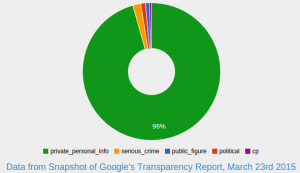Google accidentally reveals data on ‘right to be forgotten’ requests by Sylvia Tippman and Julia Powles.
From the post:
Less than 5% of nearly 220,000 individual requests made to Google to selectively remove links to online information concern criminals, politicians and high-profile public figures, the Guardian has learned, with more than 95% of requests coming from everyday members of the public.
The Guardian has discovered new data hidden in source code on Google’s own transparency report that indicates the scale and flavour of the types of requests being dealt with by Google – information it has always refused to make public. The data covers more than three-quarters of all requests to date.
Previously, more emphasis has been placed on selective information concerning the more sensational examples of so-called right to be forgotten requests released by Google and reported by some of the media, which have largely ignored the majority of requests made by citizens concerned with protecting their personal privacy.
…
It is a true data leak but not nearly as exciting as it sounds. If you follow the Explore the data link, you will find a link to “snapshots on WayBack Machine” that will provide access to the data now scrubbed from Google transparency reports. Starting about three months ago the data simply disappeared from the transparency reports.
Here is an example from the February 4th report as saved by the WayBack Machine:
“GB”: { “name”: “United Kingdom”, “requests”: {“all”: {“rejected”: 11308, “total”: 26979, “pending”: 989, “complied”: 8527, “need_more_info”: 4050}, “issues”: {“serious_crime”: {“rejected”: 483, “total”: 694, “pending”: 28, “complied”: 93, “need_more_info”: 90}, “cp”: {“rejected”: 260, “total”: 339, “pending”: 11, “complied”: 29, “need_more_info”: 39}, “political”: {“rejected”: 83, “total”: 117, “pending”: 4, “complied”: 19, “need_more_info”: 11}, “private_personal_info”: {“rejected”: 10185, “total”: 23217, “pending”: 934, “complied”: 8201, “need_more_info”: 3857}, “public_figure”: {“rejected”: 156, “total”: 220, “pending”: 12, “complied”: 38, “need_more_info”: 13}}}, “urls”: {“all”: {“rejected”: 55731, “total”: 105337, “pending”: 3677, “complied”: 29148, “need_more_info”: 15429}, “issues”: {“serious_crime”: {“rejected”: 2413, “total”: 3249, “pending”: 81, “complied”: 298, “need_more_info”: 455}, “cp”: {“rejected”: 1160, “total”: 1417, “pending”: 22, “complied”: 90, “need_more_info”: 144}, “political”: {“rejected”: 345, “total”: 482, “pending”: 17, “complied”: 58, “need_more_info”: 59}, “private_personal_info”: {“rejected”: 49926, “total”: 97413, “pending”: 3442, “complied”: 28118, “need_more_info”: 14603}, “public_figure”: {“rejected”: 1430, “total”: 1834, “pending”: 115, “complied”: 190, “need_more_info”: 95}}} },
The post concludes with:
Dr Paul Bernal, lecturer in technology and media law at the UEA School of Law, argues that the data reveals that the right to be forgotten seems to be a legitimate piece of law. “If most of the requests are private and personal ones, then it’s a good law for the individuals concerned. It seems there is a need for this – and people go for it for genuine reasons.”
On the contrary, consider this chart (from the Guardian explore the data page):
The data shows that 96% of the requests are likely to have one searcher, the person making the request.
If the EU wants to indulge such individuals, it should create a traveling “Board of the Right to Be Forgotten,” populate it with judges, clerks, transcribers, translators, etc. that visits every country in the EU on some regular schedule and holds televised hearings for every applicant and publishes written decisions (in all EU languages) on which links should be delisted from Google.
That would fund the travel, housing and entertainment industries in the EU, a perennial feature of EU funding and relieve Google of the distraction of such cases. It would establish a transparent record of the self-obsessed who request delisting of facts from a search engine and the facts deleted.
Decisions by a “Board of the Right to Be Forgotten” would also enable the monetization of requests to be forgotten, by easing the creation of search engines that only report facts “forgotten” by Google. Winners all the way around!
